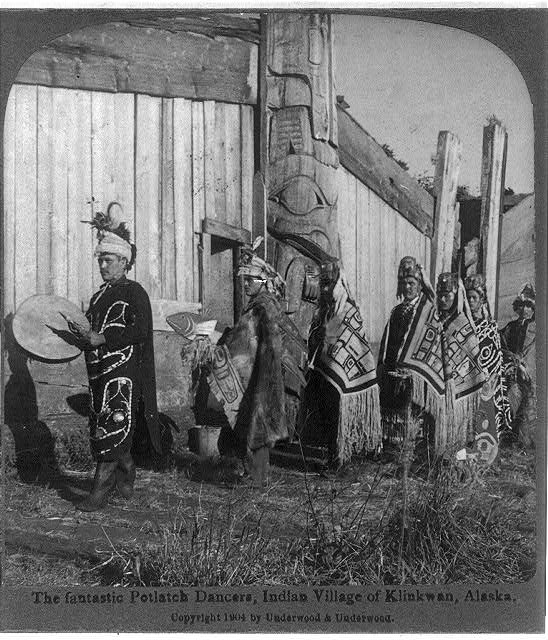Potlatch

Credit: c1904, Underwood & Underwood
Licence: No known restrictions on publication.
c1904
| Giver: | Community |
|---|---|
| Receiver: | Individual or unstructured/informal group |
| Gift: | Other |
| Approach: | Other |
| Issues: | 10. Reduced Inequalities |
| Included in: | Gift Economies |
Potlatch is a gift-giving ceremony practiced by indigenous populations in the Pacific Northwest of the U.S. and Canada. Derived from the Nootka word patshatl (“giving” or “gift”), potlatch traditionally marks a significant occasion in the life of the host and represents an expression of abundance and communal joy. In addition to the distribution of gifts, the potlatch feast involves dancing, singing and other performances. Through this display of generosity and hospitality, the potlatch host affirms their wealth and status within the community, while building a sense of solidarity between tribes.
Potlatch ceremonies serve a range of functions in the life of the tribe. A potlatch feast can commemorate major milestones such as births or marriages, or it can pay homage to a deceased ancestor. In some cases, a tribal chief will host a potlatch in order to confer their title onto a new leader, or to grant other members of the community the right to hunt or fish on their property. At other times, a community might gather for a potlatch honoring the spiritual bond between the tribe and the natural world. Potlatch can also serve as a way for someone who has incurred personal shame to make amends to their tribe.
A demonstration of power and personal prestige underlies these rituals. By bestowing gifts onto their guests, the host asserts and reinforces the existing social hierarchy. For this reason, tribal leaders compete over who can distribute the most extravagant gifts. These offerings are not limited to material objects. Granting permission for guests to use dances, songs or other rituals unique to the host’s lineage is often the most generous gesture a host can make.
The host’s preeminent place within the tribe or nation is strongly symbolized by the distinctive regalia of their family. These items typically include woven blankets, masks and carved posts. Copper sheets beaten into shields, often engraved with the host family’s crest, possess particular significance. Historically, a host might purposefully destroy one of these copper plates, as a way of challenging a rival to break a plate of comparable value. However, the implied hostility of this practice eventually led to its ban among certain tribes.
During the nineteenth century, Canadian officials viewed potlatch as a serious threat to the established order. Government ministers viewed these acts of generosity as wasteful, while church leaders objected to the perceived pagan elements in the potlatch rituals. In 1885, the government outlawed the practice altogether. Although some potlatch ceremonies continued to be held in secret, violators faced arrest and imprisonment, while regalia and other valued objects were confiscated.
The law against potlatch was repealed in 1951. In the 1970s, the Kwakwaka'wakw people successfully sued the Canadian government to reclaim regalia that had been taken from their ancestors. Since that time, potlatch has experienced a gradual revival. Although smaller in scale, these ceremonies offer an enduring symbol of unity and shared prosperity among tribes of the Pacific Northwest.
Contributors: Maha Tazi, Stephen Meyer
| Source type | Full citation | Link (DOI or URL) |
|---|---|---|
| Publication |
Barnett, Homer G. “The Nature of the Potlatch.” American Anthropologist, 40, no. 3 (1938) 349-358. |
https://www.semanticscholar.org/paper/THE-NATURE-OF-THE-POTLATCH-Barnett/2dde0fa9ed3448bfb04c7b6a780023629791694f |
| Book |
Beck, Mary Giraudo. Potlatch: Native Ceremony and Myth on the Northwest Coast. Alaska Northwest Books, 1993. |
https://iucat.iu.edu/iupui/370190 |
| Website |
Gadacz, René R.. “Potlatch.” The Canadian Encyclopedia. Historica Canada, 2006. |
https://www.thecanadianencyclopedia.ca/en/article/potlatch |
| Book |
Murdockg.,P. Rank and Potlatch among the Haida. Yale University Publications in Anthropology, 1936 |
- |
| Website |
U’mista Cultural Society. “Living Tradition. The Kwakwaka’wakw Potlatch on the Northwest Coast”. Umista Potlatch – Canada, 2022. |
https://umistapotlatch.ca/potlatch-eng.php |